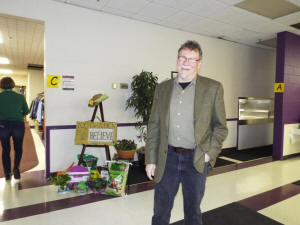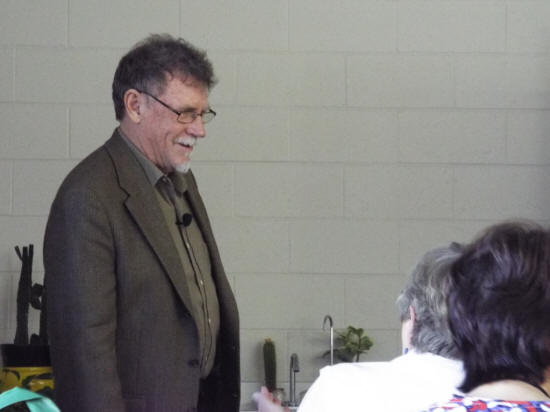|
 Concluding
morning highlight: Lincoln College's Creekside by Dr. Dennis
Campbell Concluding
morning highlight: Lincoln College's Creekside by Dr. Dennis
Campbell
 Send a link to a friend
Send a link to a friend
[March 22, 2018]
LINCOLN
- At the end of the morning breakout sessions, guests had the
opportunity for another coffee break before everyone would converged
on the cafeteria area to hear from Dr. G. Dennis Campbell. Campbell
is a retired professor from Lincoln College and the founder and
driving force behind the creation and development of the Lincoln
College Creekside Environmental Center.
|
|
The
spectacular outdoor learning center located five miles north of
Lincoln was re-named the G. Dennis Campbell Creekside Center for
Environmental Education last year.

Campbell is an enthusiastic speaker and he kept the audience
entertained for an hour while explaining the development of
Creekside, the research behind the mussel studies, the work being
done to help restore Monarch Butterfly populations, and the amazing
discover of a 14-foot Wooly Mammoth tusk in Sugar Creek, which runs
through the property.
Campbell shared that last year, the insectarium at Creekside housed
many Monarchs as they went through their multi-generational process
of preparing to fly south for the winter.
What was amazing was that the process began with only one butterfly.
That butterfly laid eggs and chrysalises formed. New butterflies
hatched, and repeated the process. This happens three to four times
in a season with each generation having a short life span. The final
generation produced more than 300 Monarchs. This last generation has
a longer life span so that they may make the journey to Mexico where
they over-winter, repeating the process so a new generation returns
to North American in the summer.

Campbell
shared photos from the Learning Center and talked about the
community areas, the development of the time trail, the donation of
the small pioneer cabin by Jefferson school, and the plans to keep
the walk back in history growing in the coming years.
[to top of second column] |

He
talked about volunteer opportunities, and said that the Center
belongs to the community, and all are welcome.
Campbell also recounted the story of finding the Wooly Mammoth
Tusk at Creekside, and how a student at Lincoln College made the
discovery during a field trip for a mussel study. Campbell said
at first, he personally laughed it off when Judd McCullum said
he had found something out of the ordinary. However, as the
pieces started coming together, Campbell realized this was going
to be a very special find.

Judd’s mammoth find was donated to the Illinois State Museum and
is back at the college on loan. Anyone wishing to see the tusk
will find it on display at McKinstry Library at Lincoln College.
[Nila Smith]
 |